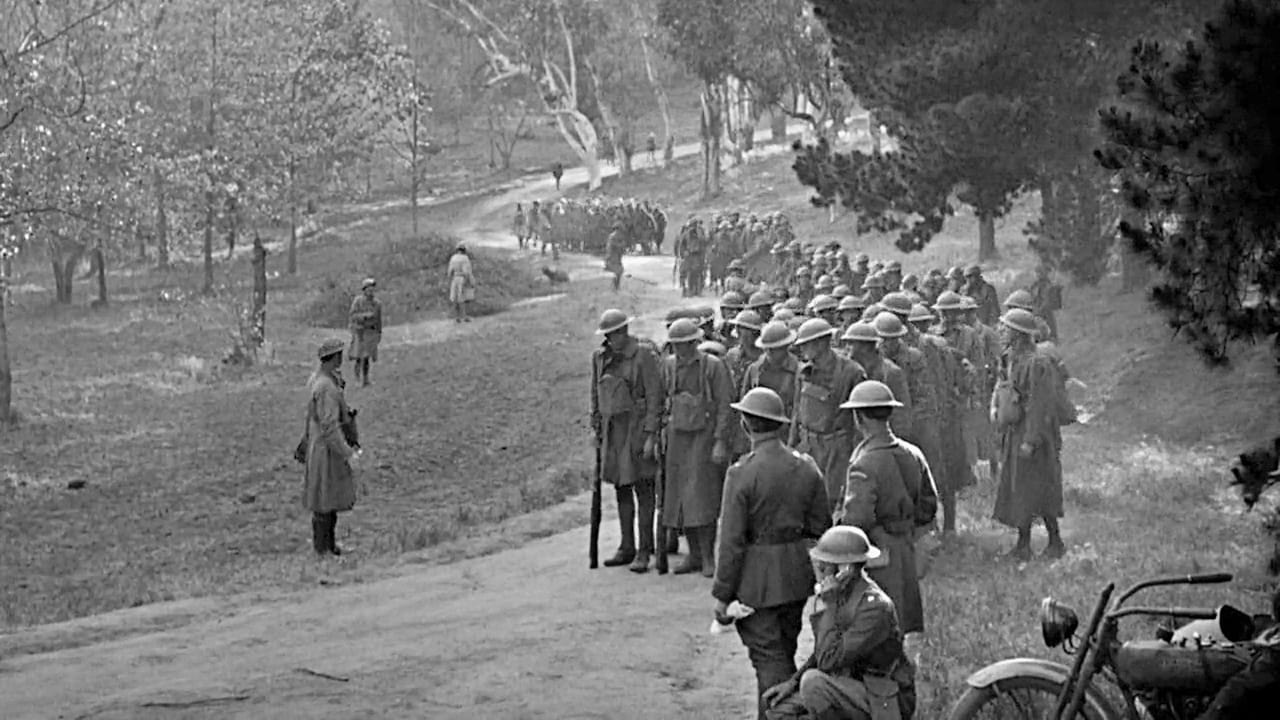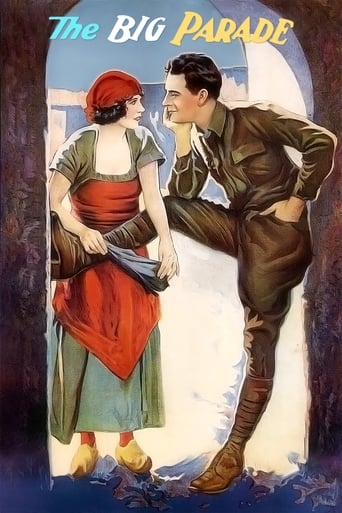



What makes it different from others?
Load of rubbish!!
From my favorite movies..
Blistering performances.
John Gilbert (a favorite of mine) is so funny, tragic, and REAL in this film. I really felt for his character (Jimmy). The first night he's away from his comfortable home, I could see the loneliness and longing in his face. The battle scenes were extraordinary - the musical score really captured the chaos and destruction of war. The scenes with the fireworks and explosions with all those men dying were breathtaking and heart wrenching. My favorite scene is when Gilbert is hitting on the French girl by the creek and he keeps stroking his finger up and down her arm and trying to kiss her. He's so nonchalant about it as if it came naturally and was improvised. I found myself smiling and softly laughing at the tender scene. That's really fine acting when a performer can make a small scene stand out like that. To me it is more memorable than the highly dramatic scene when Jimmy is out on the battlefield screaming that the Germans have killed his friend and sets out to kill the enemy - still a wonderfully acted scene, but the former just help to enforce my opinion of Gilbert as one of the finest actors ever to grace the silver screen.One scene that tugs at my heart is when Jimmy returns home and sees his mother for the first time on crutches, minus his leg. Didn't you get tense too, as the young doughboys make the march through that field with all the snipers in the trees? I also like the scene where he gives gum to Renee Adoree and she's never chewed it before. Very cute! She was another who couldn't survive the transition to sound, not because of her voice, but because of tuberculosis with which she was diagnosed in 1930. She didn't follow doctor's orders and died of the disease in 1933.Highly recommended. It's one of the only silent films that Warner Brothers has bothered to press rather than burn to DVD in the post-DVD era, and I am grateful for that.
View MoreA gritty silent era war movie.Quite realistic for its time. Certainly doesn't glamorise war, unlike many other movies of that period would. I wouldn't go so far as to say it is an anti-war movie, but it certainly doesn't paint a glorious picture of war.Not all good: the movie drifted in the middle. The escapades of the soldiers while in the camp in France seemed quite silly and just delayed the inevitable battle scenes.The over-dramatic nature of silent movies also means this hasn't aged that well. The overly stereotypical characterisations of some of the soldiers, especially the hick building construction worker, was a bit over-the-top.At the time of its release, however, it was probably revolutionary, and highly regarded.
View MoreI noticed that some reviews referred to this as the greatest war film ever or the greatest silent or the greatest silent. Well, while this is very debatable. You could easily argue that WINGS (1927), ALL QUIET ON THE WESTERN FRONT (1930) or WESTFRONT 1918 (1930) were all possibly better WWI films--but doing so does all the films a disservice. After all, can't they all be great films and who says any one of these (or another) is the greatest? And, each is amazing in its own way. Plus, how can you compare a silent to a sound film? And what about films about other wars? And what about non-war silent films? While I could see some flaws in THE BIG PARADE, you can't really compare it to films made later (technically they were so different and the style of storytelling changed a lot over the years). This film earns a 10 relative to other films of the day--other films made about 1925 aren't any better. The film has many pluses--large and rather realistic battles that are very emotionally draining, good acting by the lead (John Gilbert's performance was relatively subdued and very effective) and the story was very touching--such as when the hero's mother sees him towards the end of the film. Sure, there are a few minuses (the love between Gilbert and Renée Adorée seemed too shallow and brief to be so strong) but they are so outweighed by the strengths that they seem petty to dwell on in this review.Compelling and very watchable over 80 years later--this is one of the great silents.
View MoreKing Vidor, like descendant such as Steven Spielberg, became the biggest, most famous directors of their time both for their willingness and desire to give the people what they wanted, across as many genres as possible, to as many people as possible, and The Big Parade depicts that desire in plentiful spades.The film is nominally a war film, taking place during World War I, where the wimpy, idle son of a rich businessman (John Gilbert) is forced by expectations to join the Army, and he is sent to the frontlines in France, where he befriends a few working-class soldiers, as well as finding a sweetheart, French cutie Renee Adoree. Their courtship features the second and third genres of the film, romance and comedy, as the sweet scenes where he teaches her how to chew gum is as charmingly endearing as the love scene where their attempts to whisper sweet nothings are hampered by their constant reliance on their separate translation books; and what is romance without its cousin melodrama, who shows up in chunks to make you weep, lest you be too happy and not affected. There's tragedy and reunions in perfectly modulated chunks, and although I might have rolled my eyes once or twice, it's mostly damn successful.A grand, populist epic, The Big Parade delivers on everything it promises (and it promises a lot), making it one of the better achievements of the entire silent era.{Grade: 8.5/10 (B+) / #2 (of 5) of 1925}
View More